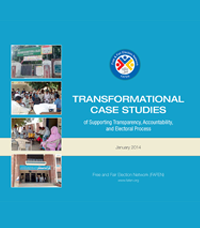The Supporting Transparency, Accountability, and Electoral Processes in Pakistan (STAEP) program is a major intervention in governance programming since July 2009. The program is aimed at enhancing the effectiveness of government in addressing the critical challenges to Pakistan by increasing citizens’ participation in ensuring transparency and accountability of elected and public institutions. The Free and Fair Election Network (FAFEN)’s field activities in the purview of governance cover activities centered around community level engagement through interactive meetings between citizens, elected representatives and other stakeholders/beneficiaries. It is implemented through citizens’ observation of governance of local institutions, identification and development of reforms agenda by the concerned citizens and the STAEP staff.
The twenty transformational case studies of the STAEP project in this report chronicle the progress towards achieving governance objectives by raising the citizens’ voice and organizing them effectively with the government officials and elected representatives to realize their agenda of community development. These case studies have been chosen by keeping in mind the principle of proportional representation. The STAEP project operates in 200 National Assembly (NA) constituencies out of total of 272. Ten percent of the NA constituencies have been chosen for the transformational case studies in this report.


